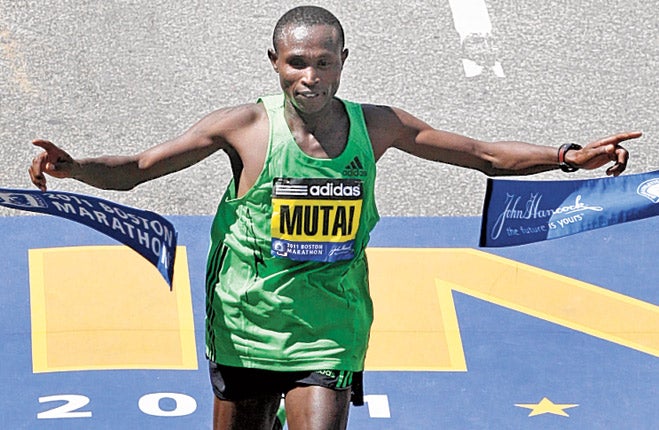Sprint is on to run first sub two-hour marathon
Day after fastest London Marathon, Kenyan wins in Boston 57 seconds quicker than 2008 world record

Another day, another marathon record. On Sunday it was Emmanuel Mutai running the fastest time in the 31-year history of the London Marathon. Yesterday, in Boston, it was Geoffrey Mutai – another Kenyan, but no relation – running the fastest marathon in the history of the planet: 2hr 03min 02sec.
It was a Boston Marathon record but not an official world record for the classic distance of 26 miles 385 yards. The Boston race is run on an undulating, roller-coaster course that is classified as "downhill" by the world governing body, the International Association of Athletics Federations.
Thus the world record for the marathon remains in possession of Haile Gebrselassie, the Ethiopian who is considered to be the greatest distance runner of all time. The 2:03:59 that he recorded in Berlin in September 2008 will remain untouched – even though Mutai and his fellow Kenyan Moses Mosop, the runner-up in 2:03:06, were faster yesterday.
It will be marked as an asterisked footnote in the record books, like the 9.69sec 100 metres that the Bardadian Obadele Thompson clocked in El Paso in 1996. The world record at the time was 9.84sec but Thompson was assisted by a following wind of five metres per second. The limit permissible for record purposes is 2.5 metres per second. It just so happened Mutai and the rest of the Boston field were helped on their way by a 20mph tailwind yesterday.
Not that wind assistance is a factor in validation of marathon records – just course elevation. Still, it is an x factor that should be taken into consideration in projecting Mutai's stunning performance – averaging 4min 43sec a mile for 26.2 miles – towards the 21st-century athletics equivalent of the four-minute mile.
Breaking the two-hour mark for the marathon has long been seen as the kind of Holy Grail that the sub-four-minute mile was considered to be before Roger Bannister took time off from his medical studies to break through the barrier at Iffley Road, Oxford, in May 1954.
Only last week, in the build-up to the London Marathon, BBC Radio 4 ran an excellent documentary on the subject. It was written and presented by Chris Dennis, a decent club runner, who attempted run on a treadmill for as long as possible at sub two-hour pace, 4min 35sec per mile. He lasted 10 seconds.
Dennis canvassed the opinion of leading authorities on the subject – Gebrselassie, Paula Radcliffe, who holds the women's world record, the Olympic marathon champion Sammy Wanjiru and London marathon race director, Dave Bedford. The consensus was that it would take another 25 years.
In the meantime, we should perhaps take the opportunity to re-evaluate the women's world record, the 2:15:25 that Radcliffe clocked in London in 2003. According to the Hungarian Scoring Tables, the definitive method of evaluating athletics performances, it is equivalent to a 2:01:58 marathon by a man.
Join our commenting forum
Join thought-provoking conversations, follow other Independent readers and see their replies
Comments
Bookmark popover
Removed from bookmarks